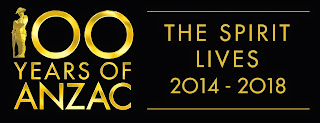 |
| Caption: Anzac Concert Party, Photographer: A J Bromfield, North Queensland Photographic Collection. |
The value of theatrical entertainment was recognized very early on during the First World War, and Australian and New Zealand soldiers had a particular knack for humorous comedy routines. Soldiers were often encouraged to audition for performance troupes run either by military units or by the YMCA, however entertainers were also sometimes hired externally in order to entertain the troops.
Concerts were usually put on at rest camps, some distance away from direct conflict, although the YMCA were known to hold shows within their own canteen huts significantly closer to the action. On special occasions and holidays ‘Division concert parties’ were put on for everyone’s enjoyment. These types of concerts included the ‘best of the best’ drawing performers from all the units that made up the division. These performances tended to be much better organized than individual unit’s impromptu gatherings, although audiences equally appreciated both. Senior officers clearly acknowledged the positive effect of theatre on the front because by the end of 1917 each military division had at least one military theatre company in operation.
According to Larry J Collins, in Theatre at War, concert parties fulfilled a number of roles for audiences and performers alike, including providing a ‘platform on which [soldiers’] grievances about food, conditions, sergeants and officers could be aired’. Theatre also played an important role in the recovery of wounded soldiers ‘according to military doctors’. But most importantly it reminded the troops of home and of a future when the types of activities they now undertook between battles would simply be ordinary activities of enjoyment.
Further Reading/References:
- Collins, L. J. Theatre at War, 1914-18: Houndmills, Great Britain: Macmillan Press, 1998.
- Collins, Larry, J. “War Culture- WWI Theatre”. Last modified December 13, 2012.
Accessed May 9, 2015. http://www.military-history.org/articles/war-culture-wwi-theatre.htm
- Holden, Robert. And the Band Played On. Melbourne, Australia: Hardie Grant Books, 2014.
- Kent, David. From Trench and Troopship: the experience of the Australian Imperial Forces 1914-1919. Melbourne: Southwood Press, 1999.



Comments